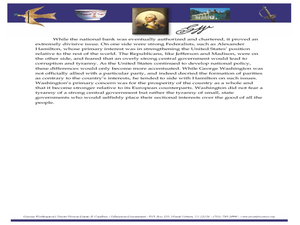Curated OER
Courtroom Testimony and Presentation
Twelfth graders examine the court process and practice writing and reviewing reports. They practice their public speaking skills as they pretend to present information to a court.
National Endowment for the Humanities
NAACP’s Anti-Lynching Campaign in the 1920s
Students investigate the anti-lynching campaign of the NAACP in the 1920's. In this human rights instructional activity, students prepare for and participate in a simulated debate of the Dyer Anti-Lynching Bill that was presented to...
Curated OER
Photographs of the 369th Infantry and African Americans during World War I
Students engage in a discussion regarding images of war we see, how quickly do we see them, and how they affect us? They view and analyze war photographs taken during World War I.
Curated OER
Mock Trial
Students rewrite a traditional fairy tale to represent the viewpoint of the villain. They participate in a mock trial of that villain in which all regular court participants (judge, jury, defendant, witnesses, plaintiff, etc) play roles.
Curated OER
Liberty Vs. Safety: an American Dilemma
Students study the process of consensus and the value of studying history as we try to craft a more perfect society. They examine President Franklin D. Roosevelt's decision to incarcerate Japanese Americans in the Western United States,...
Curated OER
I Didn't Do It! (Is Anyone guilty Anymore?)
Students explore the concept of "reasonable doubt" in our criminal court system and compare it to "preponderance of the evidence" in the civil court system. They discuss the trials of OJ Simpson and other historical criminal defendants.
Curated OER
Individual Rights - The Right To Equal Protection
Students examine the concepts of equal protection, discrimination, affirmative action, and racial profiling. They analyze the Equal Protection Clause, participate in a mock trial, and discuss the different parts of the trial.
Curated OER
Is it Legal? - The Judicial System
Fourth graders explore the judicial branch of government; in particular, Florida's judicial branch of government.
Curated OER
Local Governments Don't Do Much ... Or Do They?
Students study and explore their local government. They role play members of their City Council and various constituents as they discuss a variety of subjects typical of a city council meeting.
Curated OER
Participating in State and Local Government
Students analyze the structure, organization, and powers of State legislatures. They outline the overall shape of the office of the governor.
Students analyze the structure of local governments as creations of the State. They describe...
Curated OER
The Volstead Act and Related Prohibition Documents
High schoolers listen to the 18th Amendment. After a discussion on Prohibition, the groups determine if it was a success or a failure and present their findings to the class. They view political cartoons of the day and analyze their...
Curated OER
Comparative Government: Japan & the United States
Students compare the governmental systems of Japan and the United States. As a class, they discuss the differences between the parliamentary system and the presidential system. Pupils read provided handouts about the duties of a a...
Curated OER
Alexander Graham Bell's Patent for the Telephone and Thomas Edison's Patent for the Electric Lamp
Students read a short biographical account about Bell and student B about Edison. Ask each pair to exchange information and determine what qualities these inventors shared. Ask students if they think all inventors share these qualities.
Curated OER
Government Bingo
Pupils play a Bingo game to review the facts and concepts of the Canadian System of Government.
Curated OER
Expressive Linear Sculpture
Students develop skill in utilizing line in a 3 dimensional context. They explore a variety of techniques for mounting sculptures to a base.
Curated OER
Segregation in Prince Edward County
Eleventh graders examine the history of integration as it applied to Virginia high school in Prince Edward County. They evaluate a map of Virginia counties, read and analyze a first person narrative of a young girl involved in a boycott...
Curated OER
Canada's System of Government Overview
Students discover the resources, topics, and issues in the Canadian government and actively participate in decision-making.
Curated OER
Fugitive from Labor Cases:
High schoolers examine the cases of Henry Garnett and Moses Honner, both of the 1850s. Students analyze the political climate building up to the Civil War through the lens of these similar cases with different outcomes.
Curated OER
Washington and the Whiskey Rebellion
High schoolers explore the Whiskey Rebellion of 1794 and its significance in the early history of the United States. They explore how George Washington made the choice to meet this challenge to federal authority with military force
Curated OER
New Kent School and the George W. Watkins School:
High schoolers research the U.S. Supreme Court case that forced the integration of public schools and meet the individuals who experienced segregation, fought to dismantle the institution, and integrated the public school system of New...
Curated OER
The Seminole Wars
Students investigate the Seminole Wars, their events, and treaties. They create a timeline, label a map of Florida showing the Seminole population and do research about life on an Indian reservation.
Curated OER
What's the Difference Between Procedural and Substantive Due Process?
Students discuss the difference between substantive and procedural due process. They research the uses of due process on the internet and books. They also discuss cases involving students and due process.
Federal Reserve Bank
GDP: Does It Measure Up?
Here is resource that offers a very clear explanation for how economists measure economic growth by comparing real GDP over time. There is also an additional worksheet that details the expenditure method and four components for...
Curated OER
Using Political Cartoons to Understand Historical Events
Examine historical perspectives through the use of political cartoons. Learners complete analysis activities related to the president's title, the establishment of the national bank, and the Jay Treaty.

























